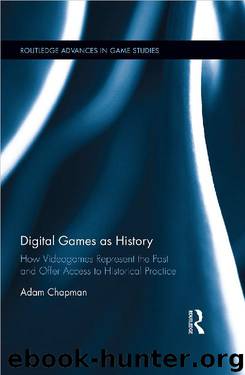Digital Games as History: How Videogames Represent the Past and Offer Access to Historical Practice by Adam Chapman

Author:Adam Chapman
Language: eng
Format: mobi
Publisher: Routledge
Published: 2016-05-05T00:00:00+00:00
Figure 6.2 Screenshot of the menu in Empire: Total War that both provides the framing goals for the single-player campaign and offers a beginning framing narrative fragment that establishes the historical context for the chosen faction.
The ludonarrative freedom, complexity and multiplicity in open-ontological games generally allows players to pursue multiple ways to achieve what framing goals are included. However, this freedom, combined with the relative lack of emphasis on, and/or variety of, framing goals in open-ontological games, importantly also allows room for, and encourages, players to experiment with the ludonarrative and to pursue their own (extratelic) goals instead of, or alongside, these framing goals. In Civilization, for example, players could aim to imitate the achievements of an existing ‘civilisation’; build a particular wonder or all the wonders in the game; discover all the technologies; see how long their civilisation can survive; theorise about the future by playing into it; create an ethical civilisation or a world they would want to live in; create perceived ironic narratives (such as a completely non-aggressive Mongol civilisation); discover all of the game world; peacefully create a culturally homogenous world, or any other kind of extratelic goal they might come up with. Players have the freedom to attempt any short or long-term goal that creates some sort of resonance, dissonance, or sense of challenge for them and that at least appears to be possible given the allowed actions, included lexia and themes of the system. Open-ontological games can therefore offer satisfaction and historical narratives beyond a simple prescripted win/loss dynamic and allow us to indulge our curiosity, all the while receiving the game’s arguments in response. As Atkins puts it of Civilization, these games offer “the possibility of departing at any time from the tyranny of competitive play to engage in an exploration of the limits and possibilities of the underlying game model” (2005, 16). And of course it is in these limits and possibilities where games (particularly conceptual games) make their arguments about the past.
This freedom in choosing goals is often further compounded by the opportunity to remove framing goals entirely. So, for example, in Civilization, Making History and Total War we are free to ignore victory conditions by choosing to continue playing beyond the point at which these would normally end play and the historical narrative.14 Doing so can be seen to deny the kind of climactic catharsis that Brecht (1964) argues make audiences complacent and less critical. In historical games, removing endings can be seen to position history as an open-ended process, denying the teleological pressure that narrative closure exerts over the past, making emplotment an uncertain and potentially unfinished player led process that denies a final genre, and thus ultimate meaning, for the past. This simultaneous emphasis on uncertainty and denial of narrative authority seems to engage deconstructionist notions of history. Most importantly to the function of these games as systems for historying (see chapters 7 and 9), it offers the freedom to function as an experimental historical narrative playground, often
Download
This site does not store any files on its server. We only index and link to content provided by other sites. Please contact the content providers to delete copyright contents if any and email us, we'll remove relevant links or contents immediately.
Blood, Sweat, and Pixels by Jason Schreier(3624)
Godot 4 Game Development Cookbook by Jeff Johnson(2918)
Dawn of the New Everything by Jaron Lanier(2772)
The Art of Doom by Bethesda(2159)
Significant Zero by Walt Williams(1963)
Creative Character Design by Bryan Tillman(1927)
Human-Computer Interaction in Game Development with Python: Design and Develop a Game Interface Using HCI Technologies and Techniques by Joseph Thachil George Meghna Joseph George(1908)
Art Of Atari by Tim Lapetino(1792)
World of Warcraft Chronicle Volume 3 by Blizzard Entertainment(1748)
Mission Python by Sean McManus(1694)
The Ultimate Roblox Book by David Jagneaux(1690)
Pillars of Eternity Guidebook by Obsidian Entertainment(1670)
Dawn of the New Everything: Encounters with Reality and Virtual Reality by Jaron Lanier(1619)
Unreal Engine Virtual Reality Quick Start Guide by Jessica Plowman(1569)
Unreal Engine 4 Virtual Reality Projects by Kevin Mack(1562)
1628927445Game by Unknown(1556)
The Ultimate Player's Guide to Minecraft by Stephen O'Brien(1544)
Learning D by 2015(1523)
Unity 2018 By Example by Alan Thorn(1466)
